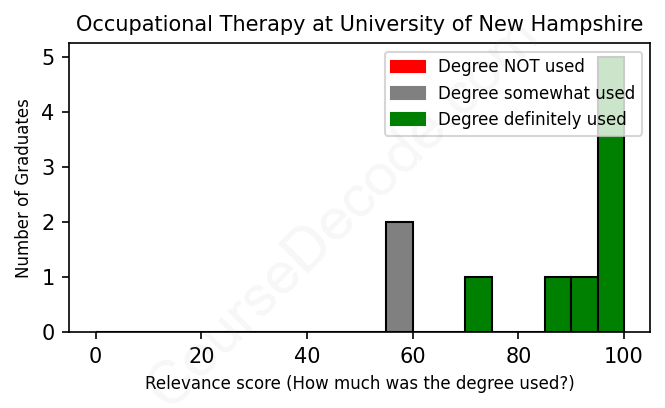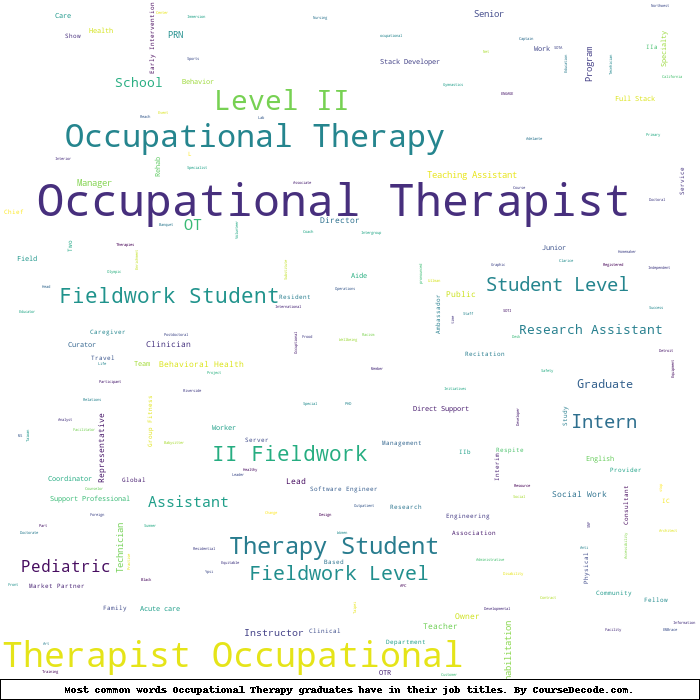
First, some facts. Of the Occupational Therapy graduates from University of New Hampshire we've analyzed , here's how many have used (or NOT used) their degree in their career:

These are estimates based on AI analysis of 10 LinkedIn profiles (see below).
The verdict? Significantly above average. Overall, with an average relevance score of 86%, Occupational Therapy graduates from University of New Hampshire have a much higher likelihood (+19%) of finding work in this field compared to the average graduate across all fields:
And for comparison, here's the chart for all profiles we've looked at across all degrees.
Also, after graduating, 80% of these graduates have pursued further education other than another Bachelor's degree (such as a Masters degree or other), compared to the average across all profiles of 35%. This suggests you may need more than just a Bachelors degree to be competitive as a Occupational Therapy graduate.
See the details:
|
Relevance score: 100% We think this person has gone into a career highly relevant to their degree. We think this person has gone into a career highly relevant to their degree.
DEGREE INFOGraduated in 2016 from University of New Hampshire with a Bachelors Degree in Occupational Therapy. Also pursued further education since (see below). JOB HISTORY SINCE GRADUATIONLevel I Fieldwork Providence VA Medical Center Jan 2016 - Jan 2016 Level I Fieldwork  Bagdad Wood Senior Living Jan 2016 - May 2016 Level II Fieldwork  Charlton Memorial Hospital Jan 2017 - Mar 2017 Level II Fieldwork  AccessPoint RI/Cornerstone School Apr 2017 - Jun 2017 Developmental Occupational Therapist  Thom Child and Family Services Jun 2018 - Aug 2022 Pediatric Occupational Therapist  kidSHINE LLC Mar 2021 - Aug 2022 Occupational Therapist  Walpole Public Schools Aug 2022 - Present FURTHER DEGREES DONE SINCE GRADUATINGMasters DegreeUniversity of New Hampshire 2016 - 2017 ABOUTNo information provided. |
The top 10 most common jobs done by the graduates we've analyzed (ranked most common to least) are:
From the analysis of LinkedIn profiles of graduates from the University of New Hampshire with degrees in Occupational Therapy, it’s clear that many of them have secured positions that are directly related to the field. A common trend is the prevalence of roles like Occupational Therapist, Pediatric Occupational Therapist, and those in academic positions connected to the education and training of future occupational therapists. The job titles reflect a strong commitment to applying their specialized knowledge in therapeutic settings, whether in rehabilitation hospitals or educational environments. Essentially, these positions allow them to utilize the comprehensive skills they gained during their education, from supporting individuals with developmental disabilities to helping pediatric populations. Many of these roles, like those at major hospitals and child development centers, show a clear pathway from graduation to professional practice in Occupational Therapy.
However, there are also instances where graduates have taken on roles that are less aligned with the core principles of Occupational Therapy. For example, some have worked as Group Fitness Instructors or in retail positions that focus more on sales than therapy. While these roles may share some overlapping skills like communication and health awareness, they are not directly relevant to the practice of Occupational Therapy as a whole. Overall, the majority of jobs obtained by these grads are relevant and aligned with their training, showcasing the strong career prospects in this field, although not everyone has stuck strictly to the conventional path expected from Occupational Therapy graduates.
Here is a visual representation of the most common words in job titles for Occupational Therapy graduates (this is across all Occupational Therapy graduates we've analyzed, not just those who went to University of New Hampshire):

From analyzing the LinkedIn profiles of graduates from the University of New Hampshire's Occupational Therapy program, it seems like most people have had solid career trajectories, particularly in the field of Occupational Therapy itself. For those who graduated in the early 2010s, like 2011 and 2012, many landed jobs as Occupational Therapists quite quickly after graduation, often at reputable institutions like Beaumont Health System, Dartmouth-Hitchcock, and various rehabilitation hospitals. It's a good sign that, right out of the gate, a lot of these grads are finding relevant positions that allow them to use their degree effectively. In the first few years post-graduation, many of them typically moved into specialized areas, like pediatric or rehabilitation therapy, becoming established professionals in their field.
As we look five to ten years down the line, these graduates often advance to higher roles, such as supervisors or even professors, which reflects a positive and upward career trajectory. For example, some are now in more senior positions like Assistant Director or Clinical Assistant Professor. It’s not uncommon to see a mix of clinical work alongside teaching or administrative roles, suggesting that the foundation they built in their early careers serves them well. Overall, it appears that a degree from this program sets graduates on a path to fulfilling and relevant careers in Occupational Therapy, and many stay actively engaged in roles where they can have a direct impact on individuals' health and development.
Hey there! So, getting a Bachelor’s degree in Occupational Therapy can be a bit of a mixed bag—it’s definitely more challenging than some other degrees, but it really depends on your interests and strengths. At the University of New Hampshire, and really anywhere you go, you’ll dive deep into subjects like anatomy, psychology, and the fundamentals of therapy techniques. Some students find these courses pretty rigorous, especially with the lab work and hands-on experiences that are a big part of the program. If you’re into science and helping people, you might find it rewarding, but if those aren’t your strong suits, it can feel pretty tough! Overall, expect a solid workload and a lot of studying, but it can be super fulfilling if you're passionate about the field.
Most commonly, in the LinkedIn profiles we've looked at, it takes people 4 years to finish a Bachelor degree in Occupational Therapy.
From looking at the careers of these Occupational Therapy grads from UNH, it seems like they’ve mostly carved out decent paths for themselves, especially once they get established. Many of them have solid job titles like "Occupational Therapist" or even "Director of Rehabilitation," which come with pretty good salaries, typically ranging from about $60,000 to over $80,000 a year, depending on the location and specialty. The ones who have moved into teaching roles or management positions probably see even better pay. However, it’s common to start with entry-level positions and internships, so their early years might not have been as lucrative. Overall, it looks like they have good earning potential and have likely made decent money over time, especially as they gain experience in a growing field.
Here is a visual representation of the most common words seen in the "about" section of LinkedIn profiles who have a Bachelor degree in Occupational Therapy (this is across all Occupational Therapy graduates we've analyzed, not just those who went to University of New Hampshire). This may or may not be useful:

Here are all colleges offering a Bachelor degree in Occupational Therapy (ordered by the average relevance score of their Occupational Therapy graduates, best to worst) where we have analyzed at least 10 of their graduates:
| College | Score | Count |
|---|---|---|
 University of New Hampshire University of New Hampshire
|
86 | 10 |